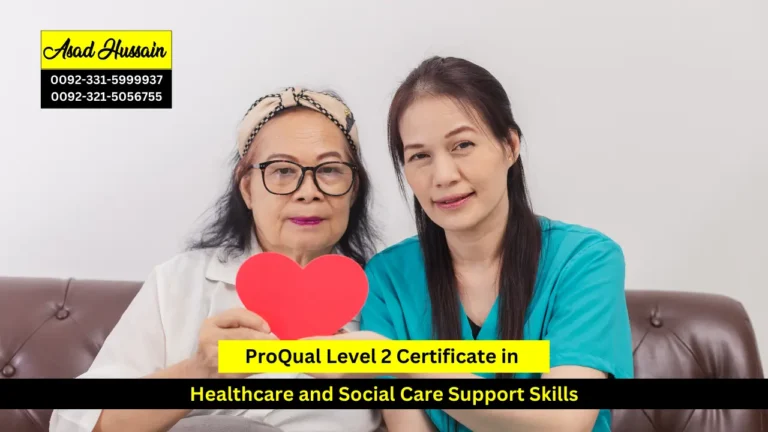The ProQual Level 2 Diploma in Healthcare and Social Care Support Skills offers a comprehensive vocational pathway for individuals seeking to establish themselves within the care sector. This substantive programme extends beyond introductory knowledge, providing learners with a deeper exploration of essential care principles including effective communication, safeguarding, health and safety, and person-centred approaches. The diploma structure enables candidates to develop both theoretical understanding and practical application, ensuring they are well-prepared to meet the demands of modern health and social care environments. Assessment is conducted through portfolio building, allowing learners to demonstrate competence through written evidence and reflective practice that reflects real-world care scenarios.
This qualification places strong emphasis on developing the values and behaviours essential to high-quality care delivery. Participants will engage with topics such as supporting individuals with their physical and emotional needs, promoting independence, understanding mental health, and respecting diversity and inclusion. The diploma format allows for greater depth of study compared to certificate-level programmes, enabling learners to build confidence across a wider range of care contexts. Throughout the programme, candidates are encouraged to reflect upon their own practice and consider how theoretical models apply to everyday interactions with individuals requiring support, whether in residential, community, or domiciliary settings.
The ProQual Level 2 Diploma in Healthcare and Social Care Support Skills is specifically designed for those who wish to demonstrate a serious commitment to the caring professions. Upon successful completion, learners may choose to pursue further specialised certifications in areas such as end-of-life care, dementia services, or learning disability support, as well as advanced diplomas focusing on supervisory responsibilities. This diploma stands as a meaningful achievement in its own right, validating both knowledge and practical capability while opening doors to enhanced employment opportunities across the care continuum. It represents a significant milestone for anyone dedicated to delivering care that is both competent and deeply compassionate.
Program Highlights
Study Units
To achieve the ProQual Level 2 Diploma in Healthcare and Social Care Support Skills; Candidates must achieve a minimum of 37 credits: a minimum of 25credits must be from the Level 2 units and the remaining 12 credits can be from any combination of units from the Level 2 or Level 3 or Level 4 units
| Sr# | Unit Title | Credit Value | GLH |
|---|---|---|---|
| 1 | Implement person centred approaches in health and social care | 5 | 33 |
| 2 | Principles of safeguarding and protection in health and social care | 3 | 26 |
| 3 | Assist in the administration of medication | 4 | 25 |
| 4 | Carry out personal hygiene for individuals unable to care for themselves | 3 | 23 |
| 5 | Support individuals with speech and language disorders to develop their communication skills | 4 | 28 |
| 6 | Perform the non-scrubbed circulating role for perioperative procedures | 3 | 23 |
| 7 | Minimise the risk of infection when transporting and storing healthcare waste | 3 | 20 |
| 8 | Assist in the issuing of prescribed items | 3 | 15 |
| 9 | Assist in the manufacture and assembly of medicinal products | 7 | 20 |
| 10 | Assist in the preparation of documentation, materials and other items for manufacture and assembly of medicinal products | 10 | 40 |
| 11 | Support individuals to carry out their own health care procedures | 2 | 15 |
| 12 | Provide support for therapy sessions | 2 | 14 |
| 13 | Contribute to the discharge of individuals to carers | 2 | 14 |
| 14 | Paediatric Emergency First Aid | 1 | 10 |
| 15 | Introduction to communication in health, social care or children’s and young people’s settings | 3 | 23 |
| 16 | Support individuals to meet personal care needs | 2 | 16 |
| 17 | Contribute to the safe use of medical devices in the perioperative environment | 4 | 29 |
| 18 | Causes and Spread of Infection | 2 | 20 |
| 19 | Prepare documentation, materials, components and other items for the preparation of aseptic products | 6 | 10 |
| 20 | Introduction to duty of care in health, social care or children’s and young people’s settings | 1 | 9 |
| 21 | Provide support for mobility | 2 | 14 |
| 22 | Assist others to plan presentations | 2 | 16 |
| 23 | Order Routine Pharmaceutical Stock | 3 | 11 |
| 24 | Dementia Awareness | 2 | 17 |
| 25 | Move and position individuals in accordance with their plan of care | 4 | 26 |
| 26 | Support individuals to manage continence | 3 | 19 |
| 27 | Handle information in health and social care settings | 1 | 10 |
| 28 | The role of the health and social care worker | 2 | 14 |
| 29 | Obtain and test specimens from individuals | 2 | 12 |
| 30 | Prepare individuals for healthcare activities | 3 | 17 |
| 31 | Assist in planning and evaluating learning activities | 3 | 22 |
| 32 | Assist the practitioner to carry out health care activities | 2 | 13 |
| 33 | Minimise the risk of infection during the removal of used linen | 2 | 15 |
| 34 | Inform an individual of discharge arrangements | 2 | 13 |
| 35 | Understand the context of supporting individuals with learning disabilities | 4 | 35 |
| 36 | Select and wear appropriate personal protective equipment for work in health care settings | 2 | 15 |
| 37 | Monitor and maintain the environment and resources during and after clinical / therapeutic activities | 3 | 20 |
| 38 | Prepare and dress for scrubbed clinical roles | 4 | 28 |
| 39 | Care for individuals with naso-gastric tubes | 3 | 20 |
| 40 | The principles of Infection Prevention and Contro | 3 | 30 |
| 41 | Assist with the provision of a pharmacy service to meet individuals’ needs | 3 | 10 |
| 42 | Contribute to the effectiveness of teams | 3 | 5 |
| 43 | Introduction to personal development in health, social care or children’s and young people’s settings | 3 | 23 |
| 44 | Support individuals who are distressed | 3 | 21 |
| 45 | Support individuals undergoing healthcare activities | 3 | 22 |
| 46 | Prepare equipment for intraoperative cell salvage blood processing | 4 | 26 |
| 47 | Assist in receiving, handling and dispatching clinical specimens | 2 | 17 |
| 48 | Assist in the sale of medicines and products | 8 | 50 |
| 49 | Receive Pharmaceutical Stock | 3 | 9 |
| 50 | Prepare aseptic products | 10 | 40 |
| 51 | Prepare and apply dressings and drains to individuals in the perioperative environment | 2 | 18 |
| 52 | Planning and Monitoring Work | 2 | 8 |
| 53 | Cleaning, Decontamination and Waste Management | 2 | 20 |
| 54 | Ensure your own Actions Reduce risks to Health and Safety | 2 | 8 |
| 55 | Introduction to equality and inclusion in health, social care or children’s and young people’s settings | 2 | 20 |
| 56 | Provide agreed support for foot care | 3 | 23 |
| 57 | Contribute to health and safety in health and social care | 4 | 33 |
| 58 | Support independence in the tasks of daily living | 5 | 33 |
| 59 | Prepare equipment for intraoperative cell salvage blood collection | 2 | 17 |
| 60 | Maintaining quality standards in the health sector | 1 | 8 |
| 61 | Emergency First Aid Skills | 1 | 10 |
| 62 | Assemble prescribed items | 3 | 15 |
| 63 | Support participation in learning and development activities | 3 | 23 |
| 64 | Provide support for sleep | 2 | 13 |
| 65 | Remove wound closure materials | 3 | 24 |
| 66 | Support individuals to eat and drink | 2 | 15 |
| 67 | Undertake agreed pressure area care | 4 | 30 |
| 68 | Meet food safety requirements when providing food and drink for individuals | 2 | 15 |
| 69 | Understand loss and grief in end of life care | 3 | 22 |
| 70 | Understand how to work in end of life care | 3 | 28 |
| Sr# | Unit Title | Credit Value | GLH |
|---|---|---|---|
| 1 | Work with babies and young children to promote their development and learning | 6 | 45 |
| 2 | Engage in personal development in health, social care or children’s and young people’s settings | 3 | 10 |
| 3 | Support individuals with multiple conditions and/or disabilities | 4 | 31 |
| 4 | Support individuals who are bereaved | 4 | 30 |
| 5 | Prepare for and carry out extended feeding techniques | 4 | 27 |
| 6 | Provide support to continue recommended therapies | 3 | 20 |
| 7 | Insert and secure nasogastric tubes | 4 | 30 |
| 8 | Develop positive relationships with children and young people | 4 | 30 |
| 9 | Provide advice and information to enable parents to promote the health and well-being of their newborn babies | 3 | 22 |
| 10 | Facilitate and monitor housing and accommodation services to support individuals with mental health needs | 5 | 32 |
| 11 | Collaborate in the assessment of environmental and social support in the community | 4 | 23 |
| 12 | Influencing Others at Work | 1 | 6 |
| 13 | Care for the physical and nutritional needs of babies and young children | 6 | 45 |
| 14 | Support families who have a child with a disability | 3 | 23 |
| 15 | Support individuals to manage their finances | 3 | 20 |
| 16 | Obtain venous blood samples | 3 | 24 |
| 17 | Implement therapeutic group activities | 4 | 25 |
| 18 | Collate and communicate health information to individuals | 3 | 20 |
| 19 | Provide information and advice to individuals on eating to maintain optimum nutritional status | 5 | 38 |
| 20 | Assist in the implementation of programmes to increase mobility, movement and functional independence | 4 | 28 |
| 21 | Receive and handle clinical specimens within the sterile field | 4 | 30 |
| 22 | Prepare anaesthetic environment and provide support for pre and post-operative anaesthesia and recovery | 5 | 38 |
| 23 | Make recommendations for the use of physical resources in a health setting | 5 | 33 |
| 24 | Maintaining quality standards in the health sector | 2 | 13 |
| 25 | Understand Models of Disability | 3 | 26 |
| 26 | Support individuals to access and use services and facilities | 4 | 25 |
| 27 | Promote and implement health and safety in health and social care | 6 | 43 |
| 28 | Support young people with a disability to make the transition into adulthood | 5 | 40 |
| 29 | Understand mental well-being and mental health promotion | 3 | 14 |
| 30 | Carry out vision screening | 4 | 27 |
| 31 | Assist professionals to support individuals from diverse linguistic and cultural backgrounds to access speech and language therapy services | 5 | 35 |
| 32 | Implement hydrotherapy programmes for individuals and groups | 5 | 35 |
| 33 | Deliver exercise sessions to improve individuals’ health and wellbeing | 5 | 32 |
| 34 | Provide support to the surgical team when preparing individuals for operative and invasive procedures | 4 | 32 |
| 35 | Facilitate person centred assessment, planning, implementation and review | 6 | 45 |
| 36 | Work in partnership with families to support individuals | 4 | 27 |
| 37 | Support individuals to develop and run support groups | 3 | 24 |
| 38 | Monitor own work practice in health, social care or children’s and young people’s settings | 3 | 20 |
| 39 | Perform first line calibration on clinical equipment to ensure it is fit for use | 3 | 20 |
| 40 | Monitor and review individuals progress in relation to maintaining optimum nutritional status | 3 | 26 |
| 41 | Give presentations to groups | 4 | 26 |
| 42 | Support individuals in undertaking their chosen activities | 4 | 24 |
| 43 | Control the use of physical resources in a health setting | 3 | 25 |
| 44 | Support children and young people experiencing transitions | 3 | 28 |
| 45 | Promote communication in health, social care or children’s and young people’s settings | 3 | 10 |
| 46 | Contribute to the prevention of aggressive and abusive behaviour of people | 4 | 26 |
| 47 | Service improvement in the health sector | 3 | 20 |
| 48 | Understand the process and experience of dementia | 3 | 22 |
| 49 | Understand Physical Disability | 3 | 22 |
| 50 | Support individuals with a learning disability to access healthcare | 3 | 25 |
| 51 | Undertake urethral catheterisation processes | 4 | 28 |
| 52 | Promote good practice in handling information in health and social care settings | 2 | 16 |
| 53 | Understand mental health problems | 3 | 14 |
| 54 | Perform routine Electrocardiograph ECG Procedures | 4 | 30 |
| 55 | Undertake treatments and dressings of lesions and wounds | 4 | 25 |
| 56 | Adapt and fit healthcare equipment, medical devices, assistive technology, or products, to meet individuals’ needs | 6 | 37 |
| 57 | Administer oral nutritional products to individuals | 5 | 35 |
| 58 | Promote effective communication with individuals with sensory loss | 4 | 30 |
| 59 | Work with other professionals and agencies to support individuals with physical disability | 3 | 23 |
| 60 | Support individuals to access housing and accommodation services | 4 | 24 |
| 61 | Identify information requirements in a health context | 4 | 30 |
| 62 | Prepare and reproduce permanent radiographic images | 4 | 23 |
| 63 | Develop and prepare speech and language therapy resources for alternative and augmentative communication AAC use | 4 | 25 |
| 64 | Carry out wound drainage care | 4 | 32 |
| 65 | Prepare and provide surgical instrumentation and supplementary items for the surgical team | 6 | 43 |
| 66 | Care for a newly born baby when the mother is unable to do so | 4 | 32 |
| 67 | Understand Child and Young Person Development | 4 | 30 |
| 68 | Provide support to maintain and develop skills for everyday life | 4 | 28 |
| 69 | Facilitate learning and development activities to meet individual needs and preferences | 5 | 35 |
| 70 | Enable individuals with behavioural difficulties to develop strategies to change their behaviour | 8 | 41 |
| 71 | Reprocess endoscopy equipment | 4 | 30 |
| 72 | Support individuals with cognition and learning difficulties | 5 | 34 |
| 73 | Assist in testing individuals’ abilities prior to planning physical activities | 5 | 38 |
| 74 | Support individuals to manage dysphagia | 5 | 35 |
| 75 | Provide advice on foot care for individuals with diabetes | 3 | 23 |
| 76 | Transport, transfer and position individuals and equipment within the perioperative environment | 5 | 32 |
| 77 | Understand Sensory Loss | 3 | 21 |
| 78 | Support families who are affected by Acquired Brain Injury | 3 | 30 |
| 79 | Support individuals during a period of change | 4 | 29 |
| 80 | Perform intravenous cannulation | 4 | 34 |
| 81 | Care for individuals with urethral catheters | 4 | 30 |
| 82 | Conduct routine maintenance on clinical equipment | 4 | 30 |
| 83 | Assist and support individuals to use alternative and augmentative communication systems _AAC | 5 | 35 |
| 84 | Measure and record individuals’ body fluid balance in a perioperative environment | 4 | 23 |
| 85 | Support parents/carers to interact with and care for their newborn baby | 4 | 30 |
| 86 | Deliver training through demonstration and instruction | 3 | 21 |
| 87 | Principles for implementing duty of care in health, social care or children’s and young people’s settings | 1 | 5 |
| 88 | Promote Child and Young Person Development | 3 | 25 |
| 89 | Develop and sustain effective working relationships with staff in other agencies | 4 | 24 |
| 90 | Undertake physiological measurements | 3 | 23 |
| 91 | Undertake stoma care | 4 | 30 |
| 92 | Assure the effective functioning of radiographic image processing equipment | 4 | 25 |
| 93 | Operate equipment for intraoperative cell salvage blood collection | 5 | 40 |
| 94 | Advise and inform individuals on managing their condition | 5 | 31 |
| 95 | Assist others to monitor individuals’ progress in managing dysphagia | 5 | 38 |
| 96 | Support carers to meet the care needs of individuals | 5 | 30 |
| 97 | Maintain pharmaceutical stock | 3 | 4 |
| 98 | Anatomy and Physiology for Maternity Support Workers | 2 | 20 |
| 99 | Receive prescriptions from individuals | 3 | 15 |
| 100 | Understand how to support individuals with autistic spectrum conditions | 3 | 28 |
| 101 | Support Individuals with Specific Communication Needs | 5 | 35 |
| 102 | Obtain and test capillary blood samples | 4 | 30 |
| 103 | Support individuals at the end of life | 7 | 53 |
| 104 | Contribute to effective multidisciplinary team working | 3 | 20 |
| 105 | Analyse and present health related data and information | 4 | 30 |
| 106 | Remove wound drains | 4 | 27 |
| 107 | Develop activities and materials to enable individuals to reach specific communication goals | 5 | 38 |
| 108 | Operate equipment for intraoperative cell salvage blood processing and complete intraoperative cell salvage blood process | 5 | 39 |
| 109 | Support parents/carers and those in a parental role to care for babies during their first year | 5 | 36 |
| 110 | Obtain a client history | 3 | 22 |
| 111 | Manage the availability of physical resources to meet service delivery needs in a health setting | 5 | 33 |
| 112 | Administer medication to individuals, and monitor the effects | 5 | 30 |
| 113 | Assist in the Issuing of Pharmaceutical Stock | 4 | 5 |
| 114 | Undertake an in-process accuracy check of assembled prescribed items prior to the final accuracy check | 4 | 11 |
| 115 | Promote equality and inclusion in health, social care or children’s and young people’s settings | 2 | 8 |
| 116 | Understand the impact of Acquired Brain Injury on individuals | 3 | 28 |
| 117 | Support individuals to live at home | 4 | 25 |
| 118 | Promote person centred approaches in health and social care | 6 | 41 |
| 119 | Undertake tissue viability risk assessments | 3 | 26 |
| 120 | Interact with and support individuals using telecommunications | 5 | 36 |
| 121 | Manufacture equipment or medical devices for individuals within healthcare | 4 | 30 |
| 122 | Provide support for individuals with communication and interaction difficulties | 5 | 39 |
| 123 | Monitor individuals’ progress in relation to managing their body weight and nutrition | 3 | 26 |
| 124 | Assist in implementing treatment programmes for individuals with severely reduced movement/mobility | 5 | 29 |
| 125 | Assist in the delivery of perioperative care and support to individuals | 4 | 31 |
| Sr# | Unit Title | Credit Value | GLH |
|---|---|---|---|
| 1 | Support disabled children and young people and those with specific requirements | 6 | 45 |
| 2 | Enable children and young people to understand their health and well-being | 5 | 38 |
| 3 | Develop and agree individualised care plans for babies and families | 5 | 38 |
Entry Requirements
The following entry requirements are designed to ensure that learners enrolling onto this diploma programme possess the foundational skills and personal readiness necessary to engage successfully with the curriculum and complete the required assessment activities.
- Age Requirements: Learners must be at least 16 years of age. This minimum age reflects the level of maturity, emotional resilience, and professional conduct expected when studying topics related to vulnerability, dignity, safeguarding, and the delivery of person-centred care.
- Educational Background: While no formal academic qualifications are mandatory, learners will benefit from holding prior certifications such as the Level 1 Award in Introduction to Health and Social Care, Level 1 Certificate in Essential Skills, or basic first aid qualifications. Related diplomas in subjects such as childcare, early years, or customer service also provide a useful foundation. Achievement of the ProQual Level 2 Certificate in Healthcare and Social Care Support Skills is particularly advantageous and serves as an excellent stepping stone into this diploma.
- Language Proficiency: Learners must possess a functional standard of literacy in English, as the programme requires completion of written assignments, reflective accounts, care plans, and other portfolio evidence. A minimum of Entry Level 3 or GCSE grade D/3 in English is recommended, though centres may offer additional support or reasonable adjustments where appropriate.
- Work experience: This is not a compulsory requirement for entry onto this diploma programme. However, learners who are currently employed or volunteering within a health or social care setting will find it beneficial when contextualising theoretical content and gathering evidence for their portfolio. Those without direct care experience are still warmly welcomed and fully supported throughout their studies.
These entry criteria are intended to be inclusive and enabling, recognising that dedication, empathy, and a willingness to learn are equally as valuable as prior academic achievement. Whether you are building upon related certifications or taking your first steps into formal care education, this diploma offers a structured and supportive environment in which to grow and succeed.
Learning Outcomes
By successfully completing the ProQual Level 2 Diploma in Healthcare and Social Care Support Skills, learners will achieve the following learning outcomes:
- Comprehensive Knowledge: Acquire a solid understanding of the principles and practices involved in healthcare and social care support, including communication skills, health and safety procedures, infection control, and person-centered care.
- Effective Communication: Develop excellent communication skills to effectively interact with individuals, their families, and multidisciplinary teams, ensuring clear and accurate exchange of information while respecting confidentiality and privacy.
- Health and Safety Competence: Demonstrate competence in implementing health and safety procedures, identifying potential risks, and promoting a safe environment for both individuals and care providers.
- Person-Centered Care: Apply person-centered care approaches, recognizing and respecting the unique needs, preferences, and values of individuals, and promoting their autonomy, dignity, and well-being.
- Safeguarding and Protection: Understand the importance of safeguarding and protecting individuals, recognizing signs of abuse or neglect, and knowing how to report concerns following established protocols.
- Equality and Inclusion: Promote equality and inclusion, embracing diversity, respecting individuals’ rights, and challenging discrimination in healthcare and social care settings.
- Mental Health Awareness: Gain a fundamental understanding of mental health and well-being, including common mental health conditions, their impact on individuals, and strategies for promoting positive mental health.
- Practical Skills: Develop and demonstrate practical skills required in healthcare and social care support, such as assisting with personal care, moving and handling individuals safely, and providing emotional support.
- Reflective Practice: Engage in reflective practice, evaluating personal performance, identifying areas for improvement, and continuously striving for professional development in the healthcare and social care field.
- Ethical and Professional Conduct: Adhere to ethical standards and professional codes of conduct, demonstrating professionalism, integrity, and accountability in all aspects of healthcare and social care support.
These learning outcomes will equip learners with the necessary knowledge, skills, and attitudes to excel in healthcare and social care support roles, making a positive impact on the lives of individuals and contributing to the overall well-being of communities.
Target Audiences
The ProQual Level 2 Diploma in Healthcare and Social Care Support Skills is intended for individuals who are ready to commit to a more comprehensive and detailed programme of study within the care sector. This diploma is particularly suited to those who already hold an introductory qualification or have some practical experience and now wish to deepen their knowledge, expand their competencies, and demonstrate a higher level of professional capability. It is designed for learners who view their role in care as a meaningful career rather than merely a job, and who are motivated to provide the highest standards of support to individuals with diverse needs.
- Experienced Care Assistants and Support Workers – Those already working in roles such as residential care workers, domiciliary carers, or day centre assistants who wish to formalise their experience, gain recognition for their skills, and progress to more senior support positions.
- Holders of the ProQual Level 2 Certificate – Learners who have successfully completed the Certificate level and are seeking to build upon that foundation with a more extensive diploma that offers greater depth and broader coverage of care topics.
- Individuals with Related Introductory Qualifications – Those who hold certifications such as the Level 1 Award in Introduction to Health and Social Care, basic safeguarding certificates, or diplomas in allied fields such as childcare, early years education, or healthcare support services.
- Career Changers with Transferable Experience – Individuals moving from related sectors such as customer service, hospitality, or voluntary work who possess strong interpersonal skills and are seeking a recognised qualification that validates their suitability for care roles.
- Volunteers Seeking Professional Recognition – Unpaid carers, community volunteers, or hospice supporters who have developed significant practical experience and now require a formal diploma to reflect their capabilities and open doors to paid employment.
- School Leavers with Relevant Certifications – Young people aged 16 and above who have completed introductory care qualifications during school or college and are now ready to pursue a more advanced programme that enhances their employability within the sector.
This diploma is for anyone who understands that excellent care requires both a compassionate heart and a knowledgeable mind. It is for the support worker who wants to do more, the volunteer ready to turn passion into profession, and the certificate holder eager to take the next meaningful step. Whether you are building upon existing qualifications or bringing valuable life experience into the classroom, this programme is designed for those who are serious about making a lasting difference in the lives of others.







